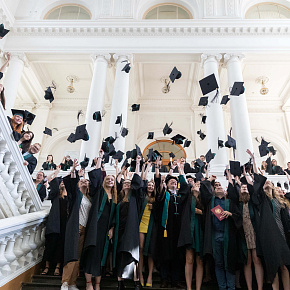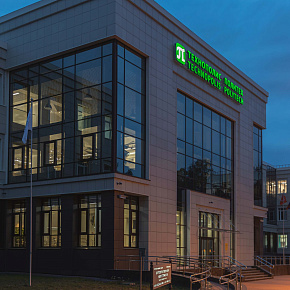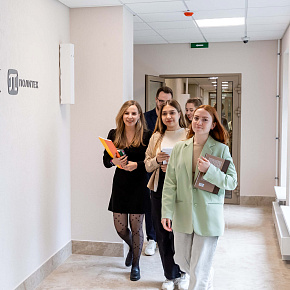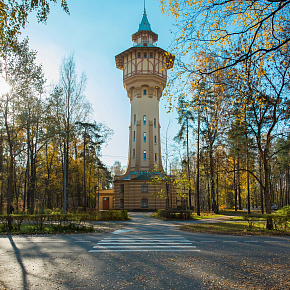Program
Participants: 3-4 year engineering and technical students from Russia (Schools of Advanced Engineering Studies), BRICS countries and neighboring countries
Language: Russian and English (groups for Russian-speaking and English-speaking participants will be formed)
The “Winter University” project consists of technical modules, an introductory Russian language course for English-speaking students, and a cultural and recreational program.
The educational and project blocks of the project are conducted by leading divisions of SPbPU School of Advanced Engineering Studies “Digital Engineering” and professors of the Higher School of International Educational Programs:
- SPbPU Computer-Aided engineering center of excellence (CompMechLab®),
- Scientific and Educational Center “Aircraft engines and power plants”,
Partners of “Winter University” project at SPbPU: ODK, TVEL Fuel Company of Rosatom, Gazprom Neft, Tsentrotekh Inzhiniring, Power Machines, Severstal.
The training will be organized in three equivalent parallel engineering tracks within the "Winter University" project:
- Sigma (for Russian-speaking students),
- Tau (for Russian-speaking students),
- Epsilon (for English-speaking students).
“Sigma” includes modules:
- Design laboratory for design,
- Design laboratory for the application of AI technologies to various types of data,
- Laboratory for Digital Transformation and Lean Manufacturing,
- Laboratory "Polymer composite materials".
“Tau” includes modules:
- Analysis of the strength of equipment and pipelines, design of buildings and structures taking into account extreme impacts,
- Fundamentals of laboratory testing of material properties,
- Aerodynamics of the aircraft wing profile,
- Personal effectiveness. Personal and professional skills development training.
“Epsilon” includes modules:
- Design laboratory for design,
- Aerodynamics of the aircraft wing profile,
- Supply Chain Management,
- Recognizing opportunities and forming the idea of a high-tech startup.
Modules for each track are conducted in parallel, each lasting 2 days, in groups of 23 people.
Educational block
1. Laboratory for Digital Transformation and Lean Production
Purpose: the participants will get acquainted with the possibilities of optimization of business processes of a modern, market-oriented enterprise using a specialized simulator system. After acquiring basic knowledge and skills on the topic, the participants will start working with the simulator.
To operate effectively, most companies need to implement digital business transformation, which is becoming one of the key factors in increasing competitiveness. With the help of a specialized simulator, participants will be able to design their transformation journey through project implementation, taking into account strategy configuration, project management and transformation project. Working in a simulation can be a key step in preparing for and adapting to the inevitable changes during digital transformation.
Format: short theoretical blocks alternated with practical exercises in virtual companies.
Outcomes: the success of the simulation exercise is reflected in the personal and overall scores, which indicate the level of competence of each participant in the implementation of lean manufacturing and digital transformation in the simulated company.
2. Personal effectiveness. Personal and professional skills development
Purpose: the module aims to develop the following cross-cutting generic competencies: leadership and proactivity, emotional intelligence, influencing, results orientation, stress tolerance, innovation, adaptability/flexibility, self-development, information analysis and decision-making:
- develop participants' goal setting and time management skills,
- practice techniques to build stress resilience and professional confidence,
- workshop on idea generation and creative solutions.
Format: workshop training with short lecture-theoretical submodules and an extensive practical block. Participants will work both individually to achieve adequate self-actualization and in small groups to practice "soft" skills.
The following active forms of training are used for practical instruction: trainings, business games, moderation and facilitation, “Open Space”, “World Café”, “Snowball”, “Fish Bawl” and other small group techniques: Mind Mapping. De Bono's six hats, SCAMPER, Brainstorming, Reverse Brainstorming, Written Brainstorming, Ship's Council, Lotus Blossom, Design Thinking Techniques, and others.
Outcomes:
- students will know: basic methods of time management, goal setting, formation of self-confident behavior, activation of thinking, formation of stress resistance, basic areas of self-development,
- students will be able to: to analyze any problem on the basis of a systematic approach, identify its basic components; to choose options for solving the problem, evaluate their advantages and disadvantages,
- students will have skills: to use time management tools to perform specific tasks, projects, to achieve goals.
3. Recognizing opportunities and forming an idea for a high-tech startup
Purpose:
- development of key entrepreneurial competencies in participants,
- train participants in the processes of identifying new opportunities, creating value and designing products based on high-tech solutions and tracking industry trends as key success factors.
Format: the training is conducted in a training format, including the following blocks:
- theoretical-practical block: project workshop,
- practical block with presentation: workshop,
- practical block: training, seminar.
Outcomes:
- knowledge of methods of generating and shaping product ideas in industry and describing research technology,
- business modeling skills in technology entrepreneurship,
- skills in innovative product planning; knowledge of the basic legal aspects of start-up creation and intellectual property registration,
- skills in developing a value proposition and communicating value,
- skills in validating potential customers,
- knowledge of the stages of team building, role models of behavior in a team; skills in constructive and leadership communication in a team; knowledge of the basics of preparing a presentation and conducting negotiations with an investor.
4. Supply chain management.
The module combines various practical tools – simulator, business games – and real case studies aimed at solving real supply chain management problems, including the involvement of experts in the field. The module contains relevant and practical information that addresses supply chain organization, operations execution and control, resource planning, operational strategy development, and more.
5. Russian language survival course for English-speaking students.
During the course the foreign students will get acquainted with the basic elements of everyday communication in Russian in order to use them in social, domestic and socio-cultural spheres.
Project block
1. Design lab for topological optimization-based design and computer-aided engineering, and 3D printing
Purpose:
- to introduce participants to advanced digital and manufacturing technologies,
- to develop an understanding of the fundamentals of additive manufacturing and an understanding of the basic principles, existing commercial additive technologies, including technological limitations and design features for additive manufacturing,
- introduction to computational engineering and topological optimization, providing an understanding of the basic logic of these technologies. Participants will apply computational engineering and topological optimization to solve both educational and design problems.
Format: project laboratory with short lecture-theoretical submodules and extensive practical block.
Outcome:
- knowledge and skills,
- industrial product design using computer-aided engineering and topological optimization,
- study of tools for solving optimization problems.
2. Strength analysis of equipment and pipelines, design of buildings and structures taking into account extreme impacts
Purpose:
- familiarization of the participants with special sections and approaches to analyzing the strength and life of equipment and pipelines, including seismic effects,
- allocation of service life of equipment and piping,
- calculation of welds using the finite element method,
- selection of basic dimensions in the design of buildings and structures taking into account wave and seismic effects; selection of reinforcement for reinforced concrete structures.
Format: project laboratory with short lecture-theoretical submodules and extensive practical block.
Outcomes:
- knowledge and skills,
- strength calculation of a typical NPP element based on the finite element method,
- approaches for modeling extreme impacts.
3. Fundamentals of laboratory testing of material properties
Purpose:
- familiarization of students with types of new materials,
- formation of approaches to evaluation of their properties.
- application of materials engineering to the creation of new products.
Format: lecture-laboratory.
Outcome:
- knowledge of new materials,
- evaluation of their properties, quality control,
- designing a product using the new material.
4. Aerodynamics of an airplane wing profile
Purpose:
- introduction to the aerodynamics of the airplane wing profile,
- modeling of aerodynamic profiles: gain knowledge of calculating and profiling geometry; calculate basic wing characteristics,
- modeling and basics of 3D printing: formation of skills on 3D modeling of aerodynamic profiles and preparation of 3D model for 3D printing,
- setting up a full-scale experiment and record the main characteristics: building students' knowledge and skills in setting up physical experiments,
- fundamentals of setting up and running numerical experiments: formation of students' knowledge on setting up numerical experiments and skills in setting up numerical experiments;
- strength of aerodynamic profile: formation of students' knowledge of strength analysis of aerodynamic profile under conditions of gas-dynamic loading;
- parametric and topological optimization of airfoil: building skills to create a problem with multivariate search for optimal parameters;
- engineering optimization: formation of students' knowledge on improvement of geometry of aerodynamic profile.
Format: project laboratory with short lecture-theoretical submodules and extensive practical block.
Outcomes:
- knowledge and skills in analytical, numerical and bench calculations of the investigated wing geometry,
- physical 3D model printed on a 3D printer.
5. A project laboratory for applying AI technologies to data of various kinds
Purpose:
- introduction to advanced neural network architectures for solving industrial problems,
- to develop an understanding of the fundamentals of processing time series, image and/or text data and an understanding of the basic principles of existing machine/deep learning technologies, including neural networks,
- introduction to preliminary data analysis and data set generation; application of the learned technologies by the participants on the example of practical tasks and real cases.
Format: project laboratory with short lecture-theoretical submodules and extensive practical block.
The practical block includes the tasks:
- classification of human activities based on accelerometer/gyroscope data,
- classification of lung scans (COVID-19 diagnosis by FLG).
Outcomes:
- knowledge and skills,
- python script generating data processing, training and validating AI technologies.
6. Laboratory “Polymer composite materials”
Purpose:
- familiarization of the participants with polymer composite materials,
- formation and improvement of professional competencies related to thermoplastic polymer composite materials (TPCM), as well as basic knowledge in the field of polymer physicochemistry,
- study of technologies for manufacturing prepregs, products and structures based on thermoplastic polymers.
Format: laboratory with short lecture-theoretical submodules and extensive practical block.
Outcomes: knowledge and skills in thermoplastic polymer composites.
Cultural block
As part of the cultural block, the participants will be offered an excursion program, including getting to know the main sights of St. Petersburg, as well as visits to the largest Russian and world art museums and architectural monuments.
In addition to the excursion program, activities aimed at acquaintance and intercultural communication of the participants and workshops of the teachers and leading staff of the Advanced School of Digital Engineering will be organized for the university students.
Social and tour program
-
Visit to the State Hermitage Museum
Guided tour in Russian and English languages
-
Visit to the State Russian Museum
Guided tour in Russian and English languages
-
Trip to Pushkin, Tsarskoye Selo State Museum and Heritage Site
Guided tour in Russian and English languages
-
Trip to Kronstadt
Guided tour in Russian and English languages
Lectures and workshops
Guest speaker's lecture
A lecture by an invited expert is planned, who will analyze with the participants various cases and examples of projects from the industry.
TED format lecture “Technologies of the Future. What are they?”
The speaker will talk about the technologies that exist today and where and how they are being used. The speaker will talk about the benefits of implementing the technologies both in production and in everyday life.
Pitch session to get to know the participants
As part of the pitch session, teams of the participants will prepare presentations to talk about themselves. This pitch session is planned as an event for the participants to get to know each other.
Presentation “How to get Master’s Degree?”
Presentation of Master's degree programs of the School of Advanced Engineering Studies in Digital Engineering.
Engineering Championship
As part of the championship, the participants will be divided into teams. The task of each team is to design and build a bridge out of spaghetti, scotch and plasticine.
An evening of hospitality
Welcome evening for the participants from the PolyUnion international club of SPbPU
Other activities
-
Team building
The aim of the event is to introduce participants to each other and former proper teams
-
A sightseeing tour of the SPbPU campus
Excursion around the SPbPU campus with visits to leading laboratories and centers
-
Visit to the Museum of SPbPU History
Introduction to the history of SPbPU
View program





